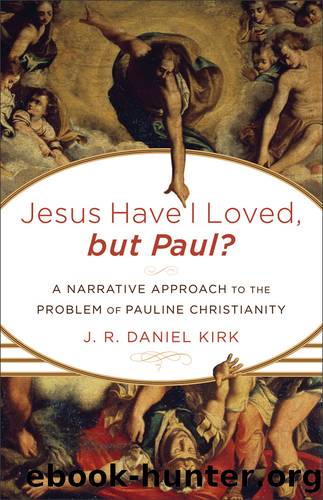Jesus Have I Loved, but Paul? by J. R. Daniel Kirk

Author:J. R. Daniel Kirk
Language: eng
Format: epub
Tags: REL006720, REL006100, Bible. N.T. Epistles of Paul—Theology, Jesus Christ—Teachings, Narrative theology
Publisher: Baker Publishing Group
Breaking Down Our Dividing Walls
Paul and Jesus share a frame of reference when it comes to questions of judgment and inclusion of outsiders: Jesus is the Messiah who is therefore Lord over all things and the One to whom we must be faithful if we would enter into the eternal salvation that Jesusâs death and resurrection bring about. Those who submit to Jesusâs reign are themselves the family of God. And because following Jesus determines the family identity, anomalous behavior that strays from the way of Jesus is a matter of mutual concern and correction. The flip side of this familial identity, however, is that judgment of outsiders is left in the hands of God while we are simultaneously called to see Jesusâs reign more fully realized on earth through our own being sent into the world to make disciples.
Thinking about our postmodern cultural context, this complex set of interrelated themes creates both opportunities and challenges. First, the opportunities.
The Jesus who is Lord over all things will not demand that the church become culturally homogenous. The gospel is always contextualized. This, Frankeâs âindigenization principle,â is what we have seen throughout this book as Jesus and Paul have told the same story for different contexts. The whole New Testament is a testimony to how people in different contexts think about, articulate, and perform the gospel differently. Even with an all-encompassing, cosmic narrative to tell, Christianity admits of a rich diversity. More than this, it demands that we continually reassess how to tell the story so that it makes sense in the worlds that we live in.
In a society marked by its plurality of cultures, we discover that many of our judgments about the world seem normal to us simply because of the context we are immersed in. Encountering people from countries that do not share the industrialized worldâs perspectives on historical âdevelopment,â people from other parts of our own countries, or even simply people from our same towns who do not traverse the same Christian terrain where we so freely moveâeach of these can have the effect of making us more self-aware and self-critical about how we articulate the Christian message.
And here is where Paul becomes an invaluable resource for the church. As the first person to take the gospel across cultural boundaries, he simultaneously insisted that his gentile converts had become part of a story that had not previously defined their identities (they are transformed) and that they did not have to adopt the peculiar ethnic identity that marked out Jewish Christians (the gospel became indigenous to their culture). A transformation had taken place, but it was a metamorphosis into the story of the crucified Christ and the God of Israel, not a metamorphosis into the likeness of the dominant Christian subculture.
And so as we grow in our awareness that our ways of articulating Christian theology are deeply contextualized, we open ourselves to the possibility that postmodern or non-Western cultures might choose not to adopt our way of speaking and living Christianlyâand that such difference within the body need not be a source of division.
Download
This site does not store any files on its server. We only index and link to content provided by other sites. Please contact the content providers to delete copyright contents if any and email us, we'll remove relevant links or contents immediately.
The Five People You Meet in Heaven by Mitch Albom(2841)
Name Book, The: Over 10,000 Names--Their Meanings, Origins, and Spiritual Significance by Astoria Dorothy(2490)
Real Sex by Lauren F. Winner(2474)
The Holy Spirit by Billy Graham(2416)
The Secret Power of Speaking God's Word by Joyce Meyer(2253)
0041152001443424520 .pdf by Unknown(2220)
How The Mind Works by Steven Pinker(2213)
Ancient Worlds by Michael Scott(2102)
ESV Study Bible by Crossway(2091)
The Meaning of the Library by unknow(2067)
The Gnostic Gospels by Pagels Elaine(2026)
Churchill by Paul Johnson(2011)
MOSES THE EGYPTIAN by Jan Assmann(1971)
The ESV Study Bible by Crossway Bibles(1909)
Jesus by Paul Johnson(1887)
The Nativity by Geza Vermes(1848)
Ancient Near Eastern Thought and the Old Testament by John H. Walton(1846)
The Complete Dead Sea Scrolls in English (7th Edition) (Penguin Classics) by Geza Vermes(1840)
City of Stairs by Robert Jackson Bennett(1825)
